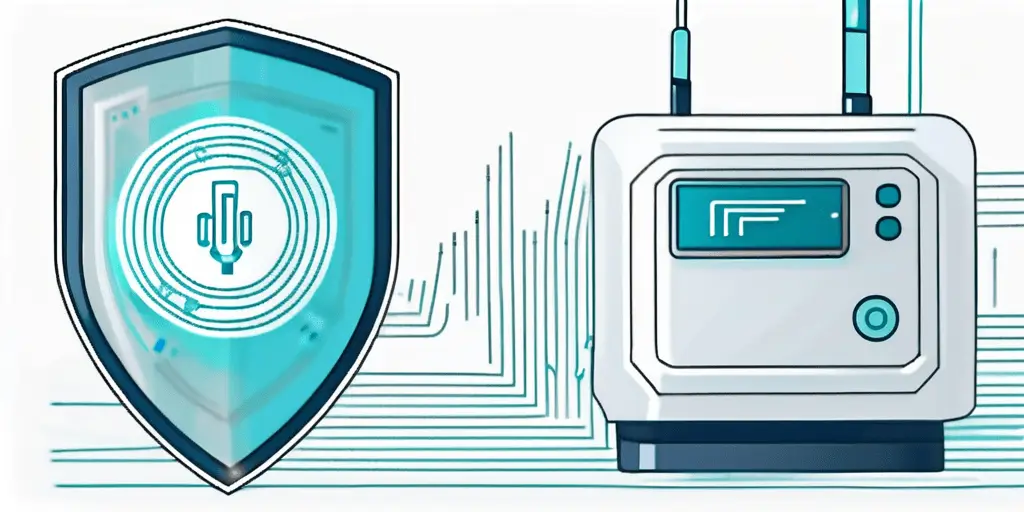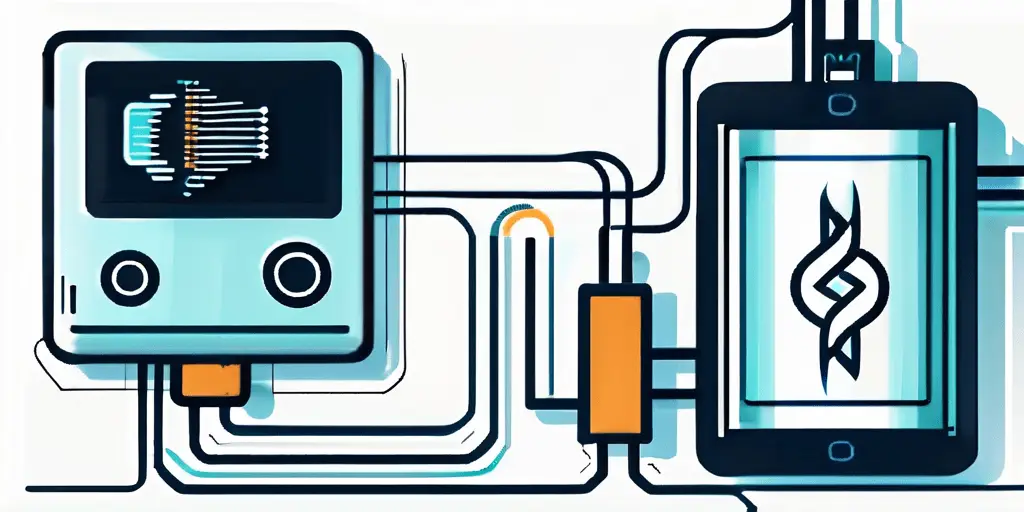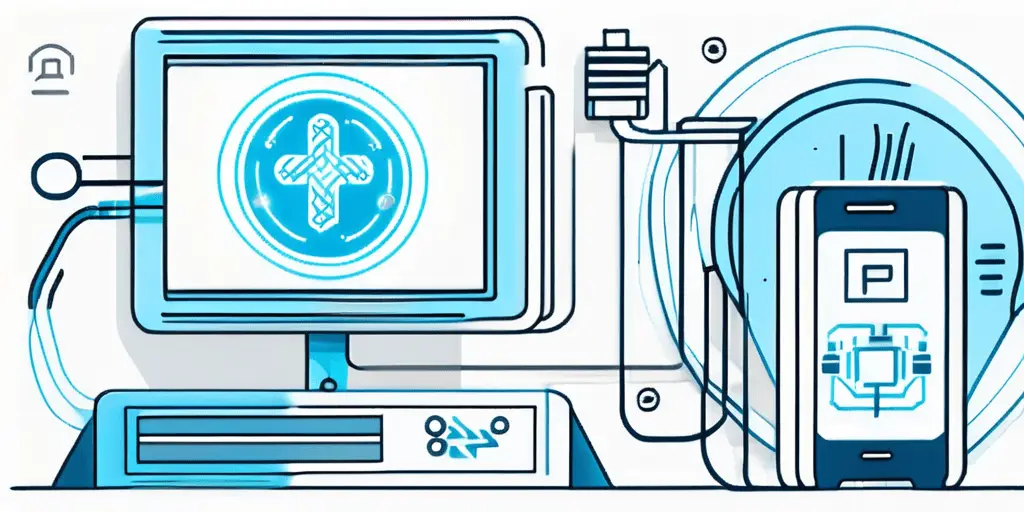Updated October 26, 2024
In today’s interconnected world, where data is king and cyber threats loom at every corner, the need for robust cybersecurity measures has never been greater. This is particularly true in the healthcare industry, where the stakes are high, and lives are on the line. One technology that has emerged as a game-changer in medical device cybersecurity is Near Field Communication or NFC.
Understanding NFC Technology

Near Field Communication (NFC) is a remarkable wireless communication technology that has revolutionized the way devices interact with each other. It enables the transfer of data between two devices by simply bringing them close together, typically within a few centimeters. This proximity requirement ensures secure data transfer and enhances user convenience in various applications.
What is NFC?
NFC operates on the principle of electromagnetic induction, allowing devices in close proximity to communicate and exchange information seamlessly. This technology is widely used in contactless payment systems, access control systems, and data sharing between smartphones, making it an integral part of our daily lives.
How Does NFC Work?
Unlike other wireless technologies like Bluetooth or Wi-Fi, NFC operates over shorter distances, typically within a range of a few centimeters. This close proximity requirement adds a layer of security, significantly reducing the risk of unauthorized access.
At its core, NFC relies on two main components: an NFC initiator and an NFC target. The initiator actively generates an RF signal to establish a connection, while the target responds to this signal by transmitting data back to the initiator. This two-way communication enables seamless and secure data transfer between devices.
NFC technology has evolved to support various modes of operation, including card emulation mode, reader/writer mode, and peer-to-peer mode. Each mode serves specific purposes, such as enabling smartphones to act as contactless payment cards or facilitating data exchange between devices without complex pairing processes.
The Role of NFC in Medical Devices

Near Field Communication (NFC) technology has been making significant strides in the healthcare industry, particularly in enhancing the security and efficiency of medical devices. By enabling short-range wireless communication between devices, NFC offers a secure method for transferring data, making it a valuable tool for safeguarding sensitive patient information.
NFC in Patient Monitoring Systems
Patient monitoring systems are critical in healthcare, providing real-time insights into patients’ conditions. By incorporating NFC technology, these devices can ensure the secure and accurate transmission of vital signs data to healthcare professionals. NFC-enabled devices can also streamline patient data collection, minimizing errors and enhancing patient care.
NFC technology can facilitate seamless integration with electronic health records (EHR) systems, allowing for efficient data sharing and analysis. This integration improves the overall quality of patient care and enhances the interoperability of medical devices within healthcare facilities.
NFC in Drug Delivery Systems
Another area where NFC shines in medical devices is in drug delivery systems. NFC-enabled packaging can provide valuable information about the medication, such as dosage instructions and expiration dates. Additionally, NFC can ensure the authenticity of medications, enabling healthcare providers to detect counterfeit drugs and protect patient safety.
NFC technology can enable automatic medication adherence tracking, helping healthcare providers monitor patient compliance and intervene when necessary. This real-time data collection can lead to more personalized treatment plans and improved patient health outcomes.
Cybersecurity Challenges in Medical Devices
While the potential benefits of NFC in securing medical devices are undeniable, it’s crucial to acknowledge the cybersecurity challenges in this space.
With the rapid advancement of technology in the healthcare industry, integrating medical devices with network connectivity has revolutionized patient care. However, this digital transformation has also opened new avenues for exploiting cyber threats and vulnerabilities. As medical devices become more interconnected and sophisticated, the need for robust cybersecurity measures becomes increasingly critical to safeguard patient information and ensure the integrity of healthcare services.
Potential Threats and Vulnerabilities
Medical devices are prime targets for cyberattacks, as they often house sensitive patient data and directly connect to hospital networks. From unauthorized access to patient records to manipulating device functionality, medical device cybersecurity threats are varied and ever-evolving.
One key challenge in securing medical devices is the diverse range of legacy systems that may lack built-in security features or receive regular software updates. This creates vulnerabilities that malicious actors can exploit to gain unauthorized access to the devices and compromise patient data. Additionally, the proliferation of Internet of Things (IoT) devices in healthcare settings further complicates the cybersecurity landscape, as each connected device represents a potential entry point for cyber threats.
The Consequences of Cybersecurity Breaches
The consequences of cybersecurity breaches in medical devices can be dire. In addition to the potential compromise of patient data, breaches can lead to disruptions in medical procedures, compromise patient safety, and impact the reputation of healthcare organizations. The urgency to address these vulnerabilities cannot be overstated.
The interconnected nature of healthcare systems means that a cybersecurity breach in one medical device can have cascading effects across an entire network, potentially affecting multiple facets of patient care. The financial implications of such breaches can also be significant, with healthcare organizations facing regulatory fines, lawsuits, and costly remediation efforts to restore trust and security in their systems.
NFC as a Cybersecurity Solution
Recognizing the immense cybersecurity challenges in medical devices, NFC technology emerges as a promising solution to safeguard patient data and ensure the integrity of healthcare operations.
The need for robust cybersecurity measures becomes increasingly critical as the healthcare industry digitizes and incorporates IoT devices. NFC technology, known for its convenience and security, offers a viable solution to address these concerns. Integrating NFC into medical devices allows healthcare providers to enhance data protection, streamline operations, and improve patient care outcomes.
Enhancing Data Protection with NFC
NFC can significantly enhance data protection in medical devices by enabling secure encryption and authentication protocols. By leveraging NFC’s short-range capabilities, healthcare organizations can establish secure connections and protect sensitive data from unauthorized access.
NFC technology provides an added layer of security by requiring physical proximity for data transmission. This proximity requirement ensures that data exchanges between devices are secure and minimizes the risk of interception by malicious actors. With NFC, healthcare providers can confidently transmit sensitive information, knowing that advanced encryption mechanisms protect it.
NFC for Secure Device Pairing
In addition to data protection, NFC can play a crucial role in secure device pairing. By using NFC technology, medical devices can establish secure connections with other devices, ensuring that only authorized devices can communicate with each other. This mitigates the risk of unauthorized access and reduces the potential for cyberattacks.
NFC-enabled device pairing simplifies the integration of new medical devices into existing networks. Healthcare facilities can easily add new devices to their infrastructure without compromising security or causing disruptions to operations. This seamless connectivity facilitated by NFC enhances the efficiency of healthcare workflows and promotes interoperability among various medical devices.
Future Trends in NFC and Cybersecurity
As technology evolves rapidly, staying informed about the emerging trends in NFC and cybersecurity in the healthcare industry is essential.

In addition to the advancements in NFC technology, another area of interest is integrating blockchain technology with NFC for enhanced security. By combining blockchain’s tamper-resistant nature with NFC’s convenience, healthcare providers can ensure the integrity and confidentiality of patient data during transmission and storage.
Emerging NFC Technologies for Medical Devices
New advancements in NFC technology are paving the way for even more secure healthcare solutions. These emerging NFC technologies are promising to fortify medical device cybersecurity, from improved encryption algorithms to advanced authentication methods.
Near Field Communication (NFC) use in medical devices is not limited to data transfer alone. NFC-enabled devices can also be leveraged for inventory management, asset tracking, and even patient monitoring, providing healthcare facilities with a comprehensive solution for improving operational efficiency.
The Evolving Landscape of Cybersecurity in Healthcare
Cybersecurity in healthcare is a dynamic field that constantly evolves to keep up with the ever-growing threat landscape. Ongoing research and collaboration among industry experts drive innovation in cybersecurity practices, ensuring that medical devices remain protected against emerging threats.
Implementing artificial intelligence and machine learning algorithms in cybersecurity systems revolutionizes how healthcare organizations detect and respond to security incidents. By analyzing vast amounts of data in real-time, AI-powered cybersecurity solutions can proactively identify anomalies and potential threats, strengthening the overall security posture of healthcare networks.
Conclusion
NFC is poised to revolutionize cybersecurity in medical devices, offering enhanced data protection, secure device pairing, and countless applications in patient care. As the healthcare industry continues embracing digital transformation, the importance of robust cybersecurity measures cannot be overstated. NFC provides a powerful tool to address medical devices’ cybersecurity challenges, ultimately ensuring patients’ safety and well-being.
The urgency for advanced cybersecurity measures intensifies as the healthcare sector continues to integrate NFC technology into medical devices. Blue Goat Cyber stands at the forefront of this evolution, offering unparalleled expertise in safeguarding your medical devices against cyber threats. With our veteran-owned leadership and comprehensive services, we ensure your operations meet the highest standards of HIPAA and FDA compliance. Don’t let the complexities of cybersecurity hinder your progress in the digital healthcare landscape. Contact us today for cybersecurity help, and let us tailor a security strategy that fortifies your medical devices, protects patient data, and supports your mission to deliver exceptional care. Your security is our priority, and with Blue Goat Cyber, you can focus on what you do best—saving lives.
